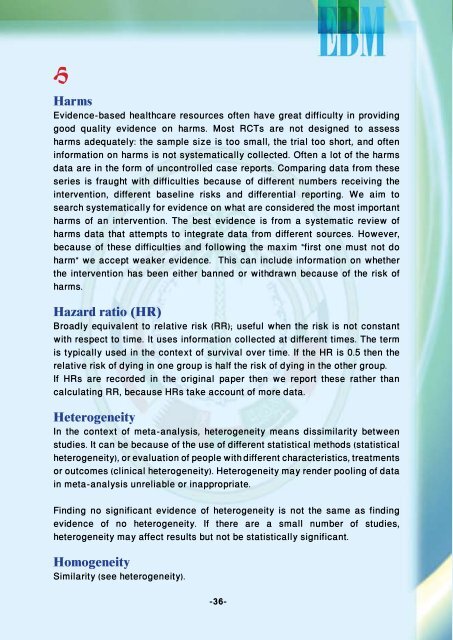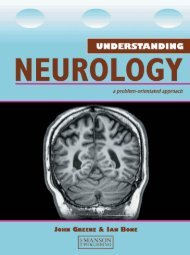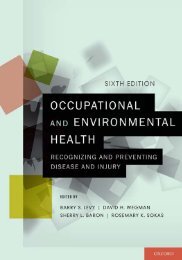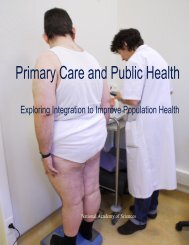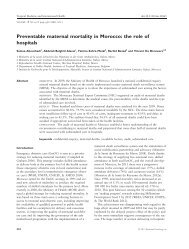Evidence-Based Medicine
Evidence-Based Medicine
Evidence-Based Medicine
You also want an ePaper? Increase the reach of your titles
YUMPU automatically turns print PDFs into web optimized ePapers that Google loves.
H<br />
Harms<br />
<strong>Evidence</strong>-based healthcare resources often have great difficulty in providing<br />
good quality evidence on harms. Most RCTs are not designed to assess<br />
harms adequately: the sample size is too small, the trial too short, and often<br />
information on harms is not systematically collected. Often a lot of the harms<br />
data are in the form of uncontrolled case reports. Comparing data from these<br />
series is fraught with difficulties because of different numbers receiving the<br />
intervention, different baseline risks and differential reporting. We aim to<br />
search systematically for evidence on what are considered the most important<br />
harms of an intervention. The best evidence is from a systematic review of<br />
harms data that attempts to integrate data from different sources. However,<br />
because of these difficulties and following the maxim “first one must not do<br />
harm” we accept weaker evidence. This can include information on whether<br />
the intervention has been either banned or withdrawn because of the risk of<br />
harms.<br />
Hazard ratio (HR)<br />
Broadly equivalent to relative risk (RR); useful when the risk is not constant<br />
with respect to time. It uses information collected at different times. The term<br />
is typically used in the context of survival over time. If the HR is 0.5 then the<br />
relative risk of dying in one group is half the risk of dying in the other group.<br />
If HRs are recorded in the original paper then we report these rather than<br />
calculating RR, because HRs take account of more data.<br />
Heterogeneity<br />
In the context of meta-analysis, heterogeneity means dissimilarity between<br />
studies. It can be because of the use of different statistical methods (statistical<br />
heterogeneity), or evaluation of people with different characteristics, treatments<br />
or outcomes (clinical heterogeneity). Heterogeneity may render pooling of data<br />
in meta-analysis unreliable or inappropriate.<br />
Finding no significant evidence of heterogeneity is not the same as finding<br />
evidence of no heterogeneity. If there are a small number of studies,<br />
heterogeneity may affect results but not be statistically significant.<br />
Homogeneity<br />
Similarity (see heterogeneity).<br />
-36-


